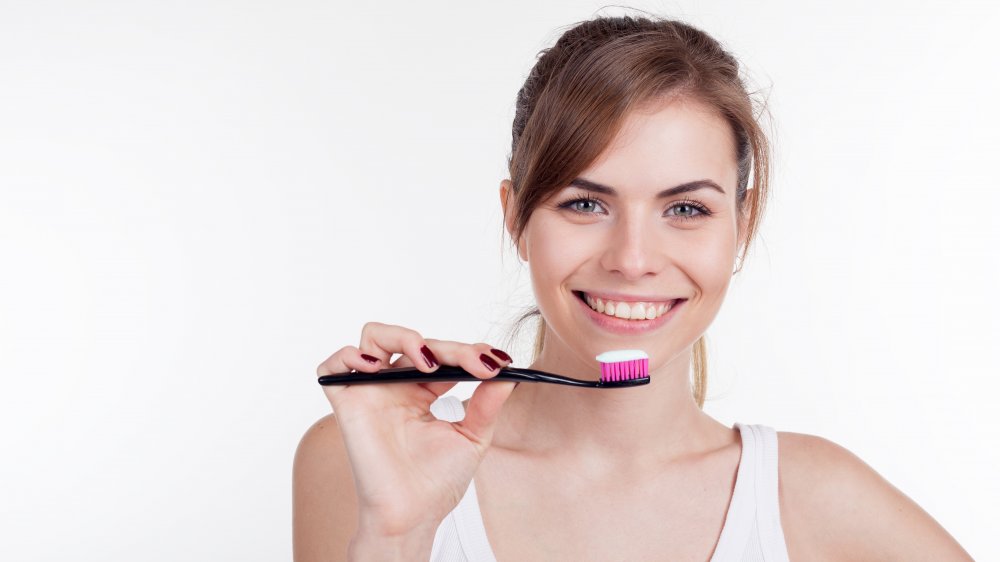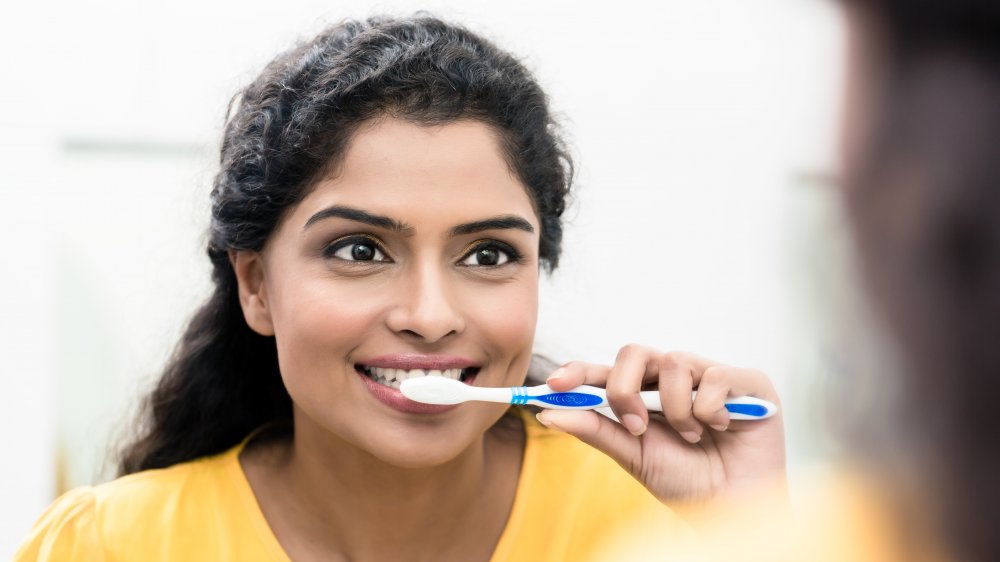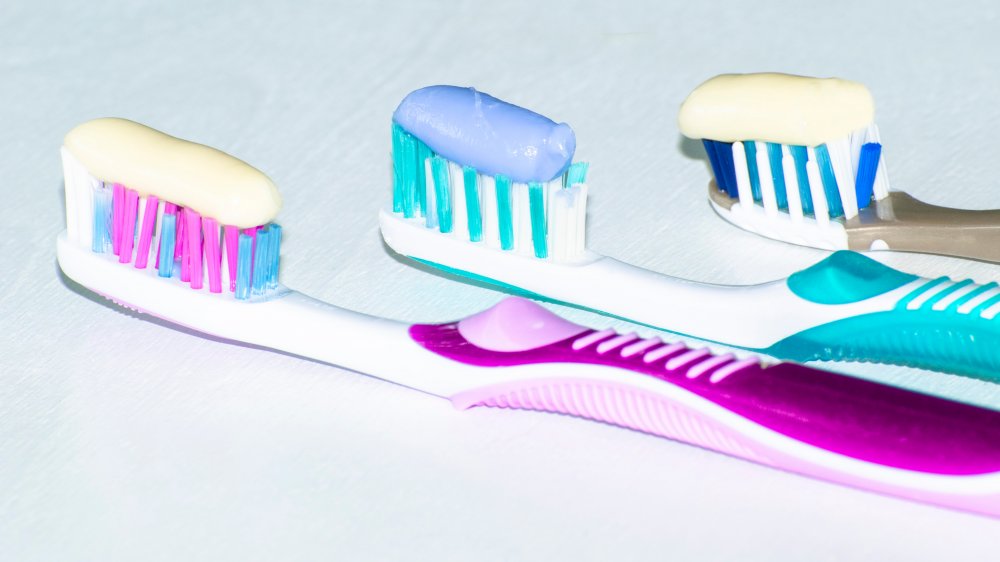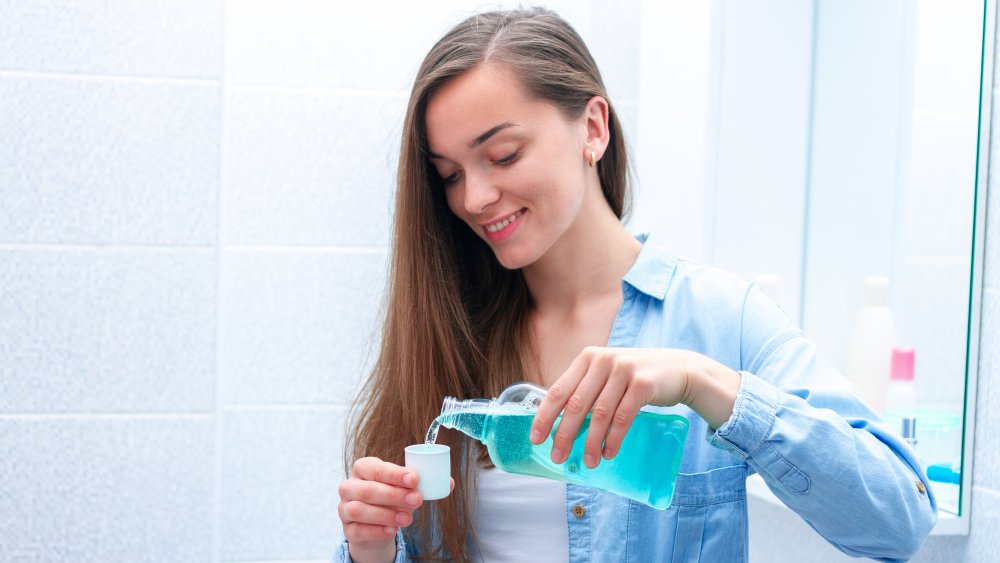You've Been Brushing Your Teeth Wrong This Entire Time
Teaching children to brush their teeth is a chore most parents would rather do without, but do those grown adults doing the teaching even know what they're doing when it comes to proper technique? Hell, nowadays, toothpaste brands are turning to YouTube stars to encourage kids to brush properly. Take Ryan Kaji, the child vlogger extraordinaire who pulled in $26 million and was named YouTube's highest paid star of 2019 — he partnered with Colgate to show other little ones that brushing their teeth can be fun (via Moms).
Unfortunately, brushing your teeth isn't actually that entertaining of an activity, no matter how old you are. But we should at least be doing it correctly, lest we risk doing more harm than good.
Brushing your teeth incorrectly is very easily done
Picking the wrong toothbrush, whether it's manual or electric, is an easy trap to fall into. Dentist Kimberly Harms told WebMD, "The one thing that we really insist upon — it's very important — is it has to have soft bristles. The bristles need to be able to bend, to kind of get right under that gum." Dentist Maricelle Abayon agreed, saying, "Soft bristles clean very effectively, more than the hard bristles. The hard bristles actually can wear down your tooth structure."
Speaking of the softer approach, dentist Matt Messina advised, "One of the biggest issues that people have is that they try to scrub their teeth too hard. They feel like if they really don't go at the teeth, like they're trying to clean the grout in their bathroom tile, that they're not doing the right job." Plaque is often loose, so think massage rather than scrub.
You should be brushing for two minutes minimum, twice a day. Those who rush to brush immediately after meals should hold off, as dentist Andy Marashi noted, "You have the acid sitting in your mouth and now you're using abrasives. So you're kind of helping the acid erode away your tooth." Wait about 20 minutes after eating before brushing, just to be safe.
Brushing your teeth properly is all about technique
Very Well Health warns if you aren't brushing your teeth correctly, you could be causing tooth abrasion or gum damage. While toothpaste is all about preference, one with fluoride protects teeth against cavities and also prevents decay. Most of us naturally start at the front of our mouths, but we should actually be focusing our attention first on the back, at the upper molars.
Point the bristles of your brush towards the gum line at a 45 degree angle and brush clockwise using short, circular motions for around 20 seconds. Then, roll the head away from the gum line and onto the surface of the tooth, to make sure you remove plaque and any food particles. Repeat on each section of your mouth. You also need to brush your cheeks and tongue, to prevent bacteria and plaque from forming, which can lead to bad breath. And don't forget to brush the backs of your front teeth.
It's also important to rinse your mouth out thoroughly. Robert Roesch, DDS, explained to Everyday Health, "Mouthwashes can help remove food particles before or after brushing, temporarily suppress bad breath, diminish bacteria in the mouth, and refresh the mouth with a pleasant taste."
And one more good practice: Always ensure you change your toothbrush every few months, or as soon as you notice any change in the bristles.
Brushing your teeth wrong may impact your overall health
Improperly brushing your teeth could have more damning consequences for your general health and well-being, too. As cosmetic dentist Marc Lowenberg, DDS told Well + Good, "Many dentists believe that there is an association between inflammation of the gum tissue and inflammatory processes in the rest of our body." Dr. Lowenberg warns, "If it's not removed with daily brushing and flossing, the bacteria in plaque can enter tiny blood vessels in the gum tissue and travel to other parts of the body."
Edmund R Hewlett, DDS, confirmed, "Oral health does indeed affect overall health, and our knowledge around this is expanding rapidly. There's research indicating that periodontitis — or gum disease — may be associated with several other health conditions such as heart disease, diabetes, or stroke."
The ancient Indian practice of Ayurveda also suggests your mouth is a major component of managing your overall health, so neglecting to pay it proper attention, or even simply brushing your teeth wrong, could be impacting your whole body in the long run.



